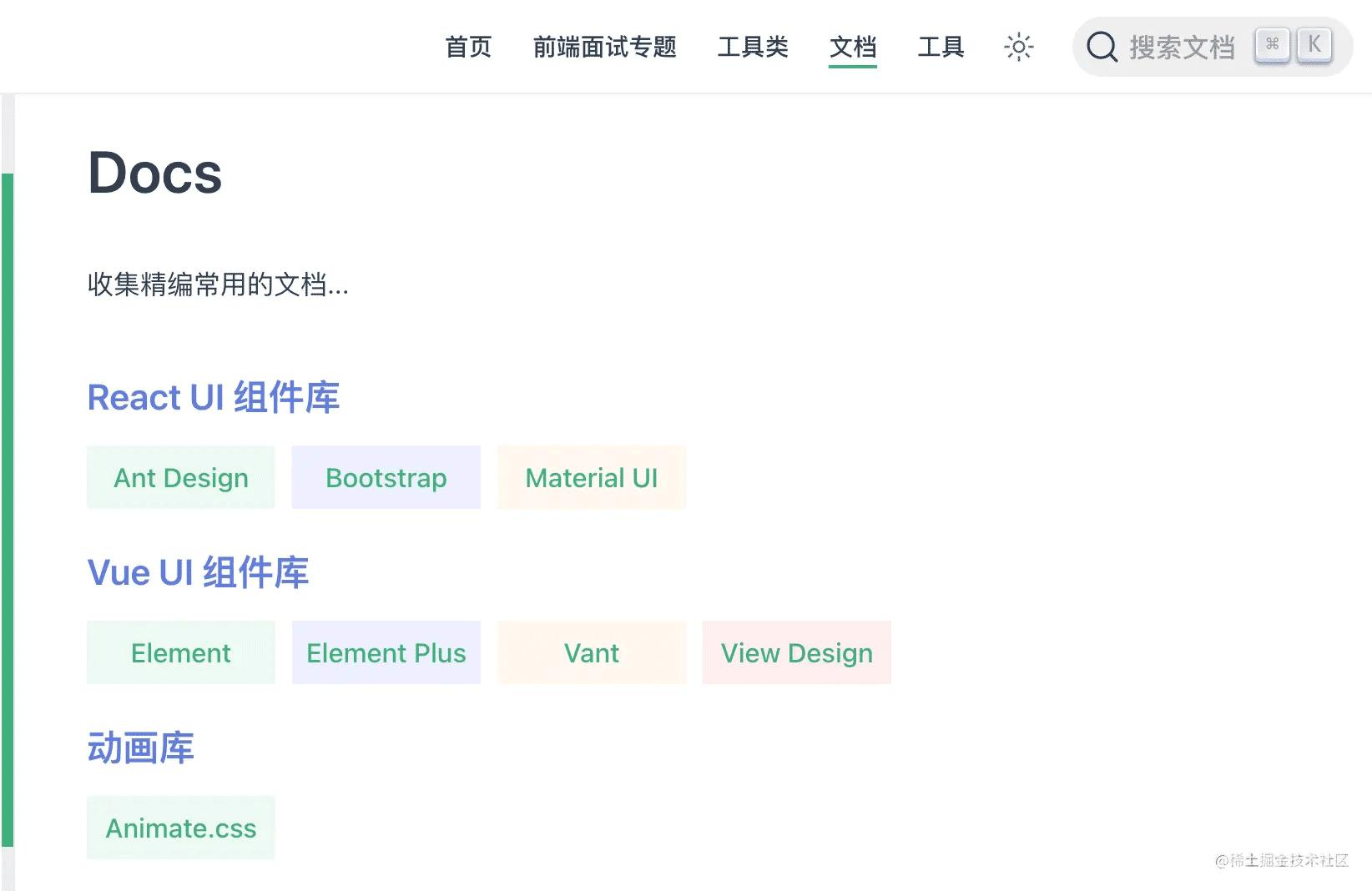目录 引言 前置环境 使用 vue 组件 安装插件 配置插件 创建 vue 组件 使用 vue 组件 引言 只是单纯的用 vuepress 写个 markdown 文档,的确会处处受限,满足不了定制化的样式和功能,有时只
目录
- 引言
- 前置环境
- 使用 vue 组件
- 安装插件
- 配置插件
- 创建 vue 组件
- 使用 vue 组件
引言
只是单纯的用 vuepress 写个 markdown 文档,的确会处处受限,满足不了定制化的样式和功能,有时只是简单的修改下某个页面,或者做些组件演示的内容,而不是开发一整套主题。所以研究下如何在项目中使用 vue 组件还有非常有必要的,毕竟也没那么难。
前置环境
- node 环境
node v16.13.0 - VuePress 版本
VuePress v2.0.0-beta.48
每个版本的使用方式还是有些差异的,尤其是 1.x 与 2.x,所以在阅读的时候尽量与自己所用的版本对比下,避免不必要的试错。
使用 vue 组件
安装插件
在 Vuepress2.x 中需要安装 @vuepress/plugin-register-components 插件并做好配置,而在Vuepress1.0中,md 文件能自动识别导出的.vue文件。
yarn add @vuepress/plugin-register-components@next // 或者 npm i -D @vuepress/plugin-register-components@next
配置插件
config.js中配置修改如下:
☞ 官方配置项文档
const { registerComponentsPlugin } = require('@vuepress/plugin-register-components')
module.exports = {
plugins: [
registerComponentsPlugin({
// 配置项
}),
],
}
我本地的配置文件的部分内容:
const path = require("path");
const { defaultTheme } = require('vuepress');
const { docsearchPlugin } = require('@vuepress/plugin-docsearch')
// ======================引入插件====================================
const { registerComponentsPlugin } = require('@vuepress/plugin-register-components')
// ======================引入插件 End================================
const navbar = require('./navbar');
const sidebar = require('./sidebar');
module.exports = {
base: '/',
lang: 'zh-CN',
title: '前端技术栈',
description: '前端白皮书',
head: [
['link', { rel: 'manifest', href: '/manifest.webmanifest' }],
['meta', { name: 'theme-color', content: '#3eaf7c' }]
],
alias: {
'@pub': path.resolve(__dirname, './public'),
},
markdown: {
importCode: {
handleImportPath: (str) =>
str.replace(/^@src/, path.resolve(__dirname, 'src')),
},
extractTitle: true
},
// ======================配置插件====================================
plugins: [
registerComponentsPlugin({
// 配置项
componentsDir: path.resolve(__dirname, './components')
})
],
// ======================配置插件 End=================================
theme: defaultTheme({
// URL
logo: 'https://vuejs.org/images/logo.png',
// 顶部导航
navbar: navbar,
// 侧边栏
sidebar: sidebar,
sidebarDepth: 2, // e'b将同时提取markdown中h2 和 h3 标题,显示在侧边栏上。
lastUpdated: true // 文档更新时间:每个文件git最后提交的时间
})
}
创建 vue 组件
在.vuepress文件夹中新建components文件夹,里面存放vue组件,文件结构如下:
├─.vuepress │ └─ components │ │ └─ Card.vue │ └─ config │ │ └─ navbar.js │ │ └─ sidebar.js │ └─ public │ │ └─ images │ └─ config.js
至此md文件就能无需引入即可自动识别.vuepress/components/下所有的vue组件了。继续完成下面的步骤,就可以看到项目中使用的效果。
Card.vue 文件内容如下,这个组件个人可以因需而定,这里只做个参照,和后面的效果对应上。key这里没有设置业务 ID 暂且使用 k来代替。
<template>
<div class="g-card-link">
<div v-for="(item,k) in value" class="g-card-item" :key="k">
<a :href="item.link" rel="external nofollow" target="_blank" :title="item.title">{{item.title}}</a>
</div>
</div>
</template>
<script setup>
import { ref, defineProps } from 'vue';
const props = defineProps({
defaultValue:String
})
const value = ref(props.defaultValue);
</script>
<style lang="scss">
button {background-color: #4e6ef2}
.g-card-link {
display: flex;
flex-wrap: wrap;
gap:10px;
text-align: center;
line-height: 38px;
.g-card-item {
background: blue;
width: 113px;
max-width: 138px;
height: 38px;
cursor: pointer;
overflow: hidden;
}
.g-card-item:nth-of-type(2n) {
background: rgba(44,104,255,.1);
}
.g-card-item:nth-of-type(2n+1) {
background: rgba(56, 203, 137, .1);
}
}
</style>
使用 vue 组件
在 docs/docs/README.md 文件直接引入Card.vue,当然文档路径你可以自由选择。这里我们给组件传了数据,如果没有数据交互会更简单,直接引用就行了。
---
data: 2022-06-14
lang: zh-CN
title: Docs 常用文档
description: 收集常用的文档
---
# Docs
收集精编常用的文档...
<div v-for="(item,k) in linkList">
<h3>{{item.title}}</h3>
<div>
<card :defaultValue="item.children"/>
</div>
</div>
<script setup>
import { ref } from 'vue';
const linkList = ref([]);
linkList.value = [
{
title: 'React UI 组件库',
children: [
{
title: 'Ant Design',
link: 'https://ant.design/docs/react/introduce-cn'
},{
title: 'Bootstrap',
link: 'https://react-bootstrap.github.io/getting-started/introduction'
},{
title: 'Material UI',
link: 'https://mui.com/material-ui/getting-started/overview/'
}
]
},{
title: 'Vue UI 组件库',
children: [
{
title: 'Element',
link: 'https://element.eleme.io/#/zh-CN/component/installation'
},{
title: 'Element Plus',
link: 'https://element-plus.org/zh-CN/component/button.html'
},{
title: 'Vant',
link: 'https://youzan.github.io/vant/#/zh-CN'
},{
title: 'View Design',
link: 'https://www.iviewui.com/view-ui-plus/guide/introduce'
}
]
},
{
title: '动画库',
children: [
{
title: 'Animate.css',
link: 'https://animate.style/'
}
]
}
]
</script>
至此组件已经引入到页面中可,我们来看看效果 ☞ 传送门 :

以上就是Vuepress使用vue组件实现页面改造的详细内容,更多关于Vuepress vue组件页面改造的资料请关注易盾网络其它相关文章!
